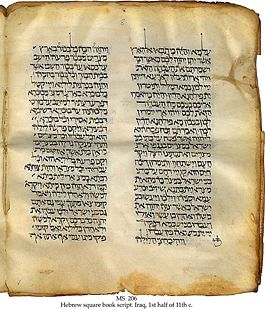Difference between revisions of "Category:Hebrew Bible"
| Line 1: | Line 1: | ||
[[Image:lighterstill.jpg]] | [[Image:lighterstill.jpg]] | ||
| − | [[Textual Status]]: [[Image: | + | [[Textual Status]]: [[Image:Beginning.jpg]] |
[[Image:Targum2.jpg|right|frame|265px|11th century manuscript of the Hebrew Bible with <center>[[Targum]]</center>]] | [[Image:Targum2.jpg|right|frame|265px|11th century manuscript of the Hebrew Bible with <center>[[Targum]]</center>]] | ||
| Line 6: | Line 6: | ||
'''Hebrew Bible''' is a term that refers to the common portions of the [[Jewish canon]] and the [[Development of the Christian Biblical canon|Christian canons]]. In its Latin form, ''[[Biblia Hebraica]]'', it traditionally serves as a title for printed editions of the [[Masoretic Text|masoretic text]]. | '''Hebrew Bible''' is a term that refers to the common portions of the [[Jewish canon]] and the [[Development of the Christian Biblical canon|Christian canons]]. In its Latin form, ''[[Biblia Hebraica]]'', it traditionally serves as a title for printed editions of the [[Masoretic Text|masoretic text]]. | ||
| − | Many [[scholars]] advocate use of the term Hebrew Bible when discussing these books in academic writing, as a neutral substitute to terms with religious connotations.<ref>In the [[Society of Biblical Literature|Society for Biblical Literature]] ''SBL Handbook of Style'' Mark Hamilton states, "Modern scholars often use the term 'Hebrew Bible' to avoid the confessional terms Old Testament and Tanakh." [http://www.pbs.org/wgbh/pages/frontline/shows/religion/first/scriptures.html From Hebrew Bible to Christian Bible: Jews, Christians and the Word of God] (end). For the recommendation of the Society for Biblical Literature, | + | Many [[scholars]] advocate use of the term Hebrew Bible when discussing these books in academic writing, as a neutral substitute to terms with religious connotations.<ref>In the [[Society of Biblical Literature|Society for Biblical Literature]] ''SBL Handbook of Style'' Mark Hamilton states, "Modern scholars often use the term 'Hebrew Bible' to avoid the confessional terms Old Testament and Tanakh." [http://www.pbs.org/wgbh/pages/frontline/shows/religion/first/scriptures.html From Hebrew Bible to Christian Bible: Jews, Christians and the Word of God] (end). For the recommendation of the Society for Biblical Literature, (The SBL Handbook of Style ISBN 1-56563-487-X) [http://web.archive.org/web/20040619030406/http://sbl-site.org/Publications/PublishingWithSBL/SBLHS.pdf online link]. Additional difficulties include: |
*Usage of ''[[Old Testament]]'' does not refer to a universally agreed canon, but rather to different sets of books depending on [[Christian denominations|denomination]]. Christian use of ''Old Testament'' is occasionally misunderstood to allude anachronistically to [[covenant theology]] or [[dispensationalism]] (these terms post-date ''Old Testament'' by more than a millennium). It can also be misunderstood to allude to a lesser known, and even more recently coined term, [[supersessionism]]. Any such allusions are naturally inimical to confessional Jewish writers. | *Usage of ''[[Old Testament]]'' does not refer to a universally agreed canon, but rather to different sets of books depending on [[Christian denominations|denomination]]. Christian use of ''Old Testament'' is occasionally misunderstood to allude anachronistically to [[covenant theology]] or [[dispensationalism]] (these terms post-date ''Old Testament'' by more than a millennium). It can also be misunderstood to allude to a lesser known, and even more recently coined term, [[supersessionism]]. Any such allusions are naturally inimical to confessional Jewish writers. | ||
*''[[Tanakh]]'' is a Hebrew acronym unlikely to be appreciated by readers unfamiliar with that language. It also refers to the particular arrangement of the biblical books as found in Judaism, and even to the exact features of the [[masoretic text]]. None of this is central to the Bible in the Christian textual tradition. | *''[[Tanakh]]'' is a Hebrew acronym unlikely to be appreciated by readers unfamiliar with that language. It also refers to the particular arrangement of the biblical books as found in Judaism, and even to the exact features of the [[masoretic text]]. None of this is central to the Bible in the Christian textual tradition. | ||
Revision as of 17:17, 30 December 2008

Hebrew Bible is a term that refers to the common portions of the Jewish canon and the Christian canons. In its Latin form, Biblia Hebraica, it traditionally serves as a title for printed editions of the masoretic text.
Many scholars advocate use of the term Hebrew Bible when discussing these books in academic writing, as a neutral substitute to terms with religious connotations.<ref>In the Society for Biblical Literature SBL Handbook of Style Mark Hamilton states, "Modern scholars often use the term 'Hebrew Bible' to avoid the confessional terms Old Testament and Tanakh." From Hebrew Bible to Christian Bible: Jews, Christians and the Word of God (end). For the recommendation of the Society for Biblical Literature, (The SBL Handbook of Style ISBN 1-56563-487-X) online link. Additional difficulties include:
- Usage of Old Testament does not refer to a universally agreed canon, but rather to different sets of books depending on denomination. Christian use of Old Testament is occasionally misunderstood to allude anachronistically to covenant theology or dispensationalism (these terms post-date Old Testament by more than a millennium). It can also be misunderstood to allude to a lesser known, and even more recently coined term, supersessionism. Any such allusions are naturally inimical to confessional Jewish writers.
- Tanakh is a Hebrew acronym unlikely to be appreciated by readers unfamiliar with that language. It also refers to the particular arrangement of the biblical books as found in Judaism, and even to the exact features of the masoretic text. None of this is central to the Bible in the Christian textual tradition.
Hebrew in the term Hebrew Bible refers to the original language of the books, but it may also be taken as referring to the Hebrew people, who originally wrote the books, and the Jews of the Diaspora, who preserved the transmission of the text up to the age of printing.
Subcategories
This category has the following 4 subcategories, out of 4 total.